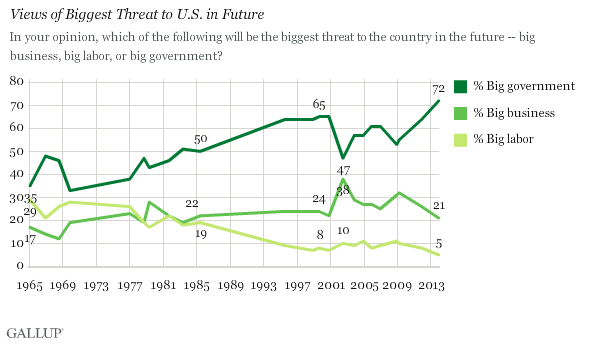That's the question Gallup began asking Americans back in 1965, and we have continued asking it on a periodic basis since. As Jeff Jones reports this week, the percentage of Americans choosing big government is now at 72%, the highest in our history of asking the question.

This antipathy toward big government is not a new phenomenon. Every time we have asked this question since 1965, big government has "won." The margin by which big government is chosen varies across the years. During the George W. Bush administration, the percentage of Americans naming big government was down some. This, most likely, reflected the aftermath of 9/11 when Americans looked to their government for protection against future terrorist threats.
But since Barack Obama entered the White House, the percentage choosing big government has been rising, to its current high point. The increasing probability that Americans see big government as the biggest threat is most likely due to rising concern about the implications of the new healthcare law, which, by its nature, involves more government control. In fact, naming big government as the biggest threat has been highest among Republicans -- who are also the most negative about Obamacare.
The perceived threat of big government may also be higher now because concern about big business as a threat has diminished as the stock market has gone up and the economy is slowly improving.
More than anything else, these findings focus us on the pivotal importance of Americans' views of the role of the federal government, perhaps the most important political issue of our day.
Some might say that the new healthcare law is the biggest issue of the day. But, as I noted, for many Americans, the controversy over Obamacare may be more about the law's implications for increased government involvement than it is about the provision of healthcare per se.
As an example of that phenomenon, take a look at this trend we reported a little earlier this fall. Clearly the tide has turned on this measure, no doubt fueled by the increased focus on a government healthcare plan as Obama took office. Opposition to the Affordable Care Act, in other words, hinges in part on opposition to the idea that government should take on the role of provding healthcare coverage to its citizens.

Others might say that inequality is now the pivotal issue of our day. President Obama has clearly laid out his view of the importance of this issue with his recent speech underscoring his focus on the big (and highly complex) issue of "increased inequality and decreasing mobility". But, a careful reading of his thoughts on the subject highlights his conviction that government programs and controls are necessary to change things in the direction he thinks is needed. So, the focus on inequality is in many ways a focus on the appropriate role of the federal government.
Still, the 72% choosing "big government" in the previously alluded to question is not necessarily an indication that 72% of Americans are opposed to any and all government actions in society today.
A different perspective comes from a question we developed a few years ago -- designed to measure just what Americans think the role of government should be. The question asks Americans to use a five-point scale to indicate whether they think government should take active steps in every area it can to improve the lives of its citizens, or if it should do only those things necessary to provide the most basic government functions.

The responses to this question are indeed pretty cleanly divided across the American population. In the latest asking of the question, 34% support a highly activist government, while 32% support a highly limited government. Another third are squarely in the middle.
So, we have 72% who choose big government as the biggest threat when forced to make a choice between it and big business and big labor, but just 32% who say that government should do only the most minimal amount possible to fulfill its functions. These findings illustrate just how complex a set of attitudes these are. Americans are clearly leery of big government in theory (and this is not at all a new phenomenon). At the same time, many Americans concede that the big government has a necessary role to play.
At the ends of this spectrum are President Obama on the one hand, who clearly believes that the federal government is the institution of choice to use to actively fix society's problems, and conservative Republicans on the other, who clearly believe that the less government the better.
All of this portends a continuing battle on this very important question in the coming months and years. I say continuing because this is a battle as old as the nation itself. A lot has changed since the 1780's, but controversy over what the government should and should not be doing for its citizens has not.
